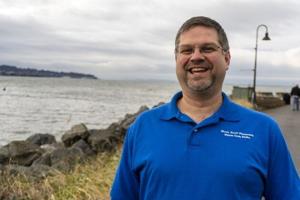Whatcom County Weather’s Randy Small is a force of nature

(The Center Square) – Lynden’s Randy Small is the first to tell people he’s not a professional meteorologist. But that hasn’t stopped Small, founder of Whatcom County Weather, from turning his interest in weather into a full-blown weather reporting service with a strong online following.
That much was obvious during last month’s record-breaking rainfall and the ensuing flooding in Whatcom County. Heavy precipitation and surging water were no match for Small’s determination to keep his followers abreast of the inclement weather’s impact on the area, including efforts to rescue people threatened by the dangerous deluge.
Small said he is convinced his Whatcom County Weather endeavor helped save lives by providing information on which areas were flooded and how to avoid motor vehicle accidents.
It was not boasting, but rather a tacit acknowledgement of the reach of his Whatcom County Weather service. His Facebook page has nearly 32,000 followers and his Twitter account has more than 4,300 followers.
Information from Whatcom County Weather’s social media sites played a role in people taking it upon themselves to help rescue people, Small explained.
Whatcom County Weather has come a long way since Small first joined Twitter in fall 2009, becoming an avid follower of storm chasers – those who deliberately pursue severe weather events, usually tornados – over the next several years. The self-described “weather enthusiast” began providing informal weather forecasts to family and friends.
“That got me interested more and more,” he said of his affinity for weather.
That eventually led to his Whatcom County Weather online presence, including donations that allowed him to quit his job at Ferndale’s Perry Pallet to focus on running his weather reporting service.
The journey from where he started to where he is now included connecting with and learning from meteorological heavyweights such as Jim Cantore of The Weather Channel and James Spann, a Birmingham, Alabama-based meteorologist, who has shared Small’s work.
“Every storm adds thousands of followers,” Small quipped about his growing weather-based endeavor.
Of course, Small takes inclement weather seriously.
He lamented the one fatality linked to the storm last month. Jose Garcia of Everson was swept away by floodwaters on his way to work at a dairy farm.
“That bothers me to this day,” Small said. “I want to learn from this.”
Beyond his weather business, the husband and father keeps busy with a photography business and pastoring at Liberty Fundamental Baptist Church in Lynden.
His full schedule doesn’t detract from his devotion to covering weather in Whatcom County, something he regards as a community service.
“I just learned so much about the Pacific Northwest,” he said of becoming more knowledgeable about the area’s weather and climate.
Small said that he’s built relationships with many people through his coverage of the flooding that is part of living in the region.
“It’s a big help,” Small said.
As for last month’s flooding, he called it “historic in nature.” Some of the local farmers – many of whom were forced to move livestock due to the rising waters – told him it was the worst they had seen in the area.
Mid-November’s widespread flooding brought power outages, school and road closures, mudslides, structural damage, and accidents as it swept through the area, causing tens of millions of dollars in damage.
The National Weather Service (NWS) confirmed last month that Seattle-Tacoma International Airport recorded 18.91 inches of rain between September and November, making it the wettest such time period since that information started being recorded in 1945.
Though not one who typically bring politics into weather, Small took exception to media reports in the days after the flooding that blamed the event on climate change.
He pointed to other factors being responsible for last month’s heavy precipitation, including a temporary warming pattern known as La Niña that means more rain and being hit by five “atmospheric rivers,” currents of warm, moist air from the tropics and subtropics that bring sustained, heavy precipitation to the area.
“Those are the things that I think about before throwing out climate change right away,” Small said. “We need more data to claim climate change. I try to keep an open mind.”
In the meantime, with Christmas approaching, Small is working to help keep up momentum for assessing damage and planning for repairs after the widespread flooding that inundated the area.
“There’s so much yet to go,” he said.
Disclaimer: This content is distributed by The Center Square


